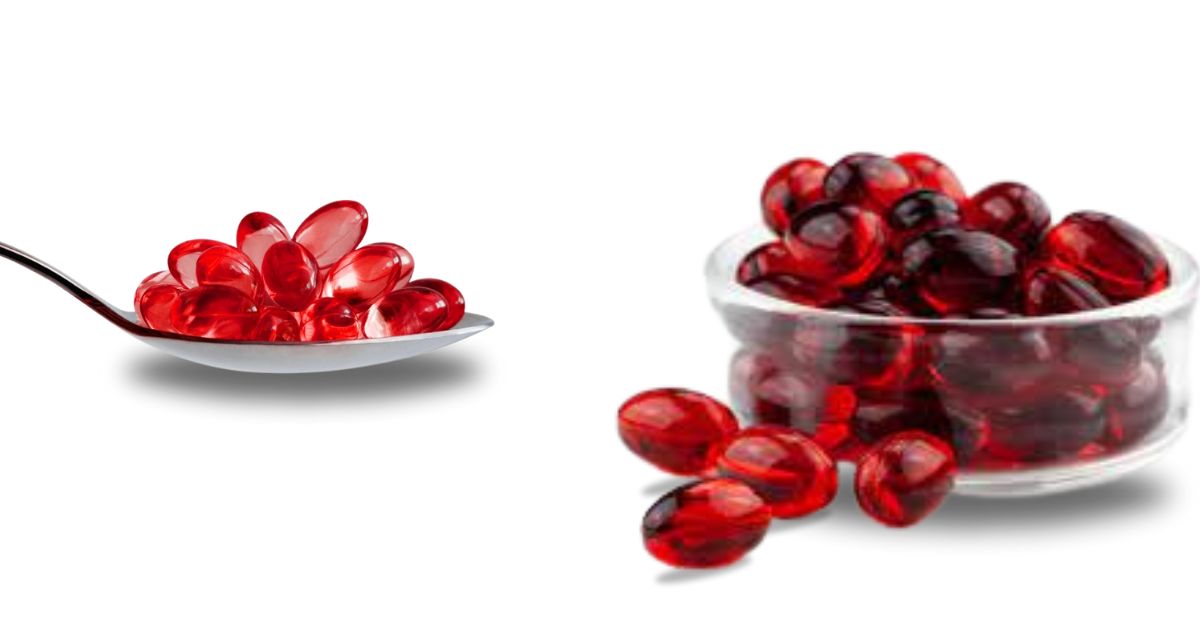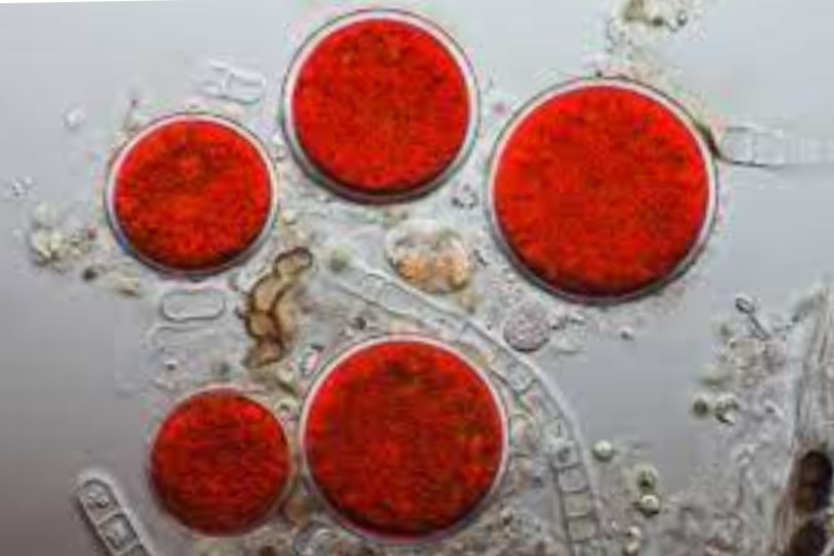The environmental impact of krill oil has become a growing concern as krill oil supplements gain popularity among those seeking omega-3 fatty acids. But have you ever wondered about the environmental impact of harvesting these tiny crustaceans?
Krill are a cornerstone of the Antarctic ecosystem, serving as the main course for whales, seals, and penguins. Overfishing them could disrupt this delicate balance. Moreover, krill play a hidden role in combating climate change by helping to sequester carbon deep in the ocean.
As demand for krill oil rises, it’s essential to consider: Can we meet our health needs without tipping the scales against our planet’s health?
In this article, we’ll dive into the environmental implications of krill oil production and explore whether sustainable harvesting is truly achievable.
Why Krill Matter: The Foundation of Marine Life
Krill are tiny shrimp-like crustaceans that form the backbone of the Antarctic ecosystem. They serve as the primary food source for a wide range of marine animals, including:
- Whales: Blue whales, the largest animals on Earth, consume tons of krill daily.
- Penguins and Seals: Many Antarctic species depend on krill for survival.
- Fish and Birds: Krill are a key part of the food chain, feeding everything from squid to seabirds.
In addition to their role in the food web, krill also contribute to the planet’s carbon cycle. By feeding on phytoplankton and excreting waste that sinks to the ocean floor, krill help remove carbon dioxide from the atmosphere. This makes them an important player in mitigating climate change.
With such a vital ecological role, the impact of harvesting krill for human consumption must be carefully managed.
The Positive Environmental Impact of Sustainable Krill Oil
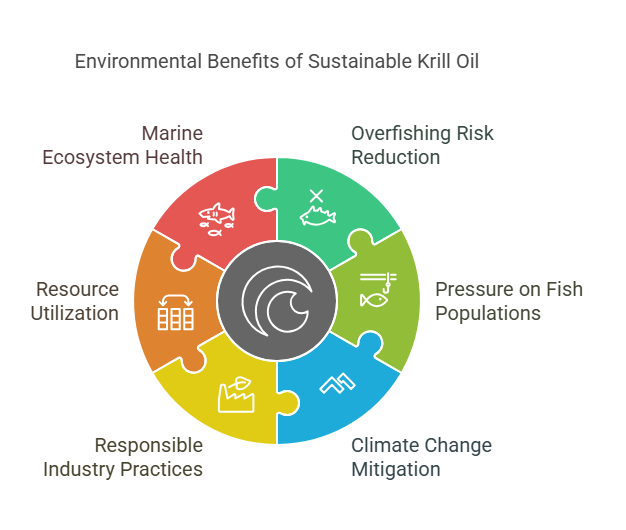
Unlike traditional fish oil, sustainable krill oil offers unique environmental advantages:
Lower Risk of Overfishing
Krill populations are abundant and carefully managed. Strict quotas ensure that only a small fraction of the total biomass is harvested annually, reducing the risk of overfishing.
Reducing Pressure on Overfished Fish Populations
With over 30% of global fish stocks overfished, alternative omega-3 sources are essential. Krill oil provides a highly bioavailable omega-3 source without further depleting fish populations like anchovies and sardines.
Supporting Climate Change Mitigation
Krill plays a key role in the ocean’s carbon cycle. By consuming phytoplankton and transferring carbon to deep-sea sediments, they help reduce atmospheric CO₂ levels. Sustainable harvesting ensures krill continue their natural role in carbon sequestration, supporting global climate stability.
Encouraging Responsible Supplement Industry Practices
As consumer demand for eco-friendly omega-3 products grows, more supplement companies are prioritizing sustainability. The success of sustainable krill oil encourages the entire industry to adopt responsible sourcing methods, reducing environmental harm across the board.
Efficient Resource Utilization
Innovative harvesting techniques, such as continuous pumping systems, have been developed to minimize bycatch and reduce waste. These methods allow for the gentle extraction of krill from nets directly into the vessel, reducing stress and damage to the krill and significantly decreasing bycatch. This approach ensures a more sustainable harvest and promotes the efficient use of marine resources by targeting krill specifically and preserving the broader ecological balance.
Supports Marine Ecosystem Health
Adhering to strict catch limits is essential for maintaining the health of marine ecosystems. Regulatory bodies, such as the Commission for the Conservation of Antarctic Marine Living Resources (CCAMLR), have established precautionary catch limits to ensure that krill harvesting does not disrupt the food chain.
These limits are set based on scientific assessments of krill biomass and the dietary needs of their predators, including whales, seals, and penguins. By enforcing these regulations, we can maintain the balance of marine ecosystems, ensuring that krill populations remain robust and continue to fulfill their crucial role in the Antarctic food web.
By choosing sustainably sourced krill oil, consumers can support these environmental benefits and promote a healthier planet.
How Consumers Can Make a Difference
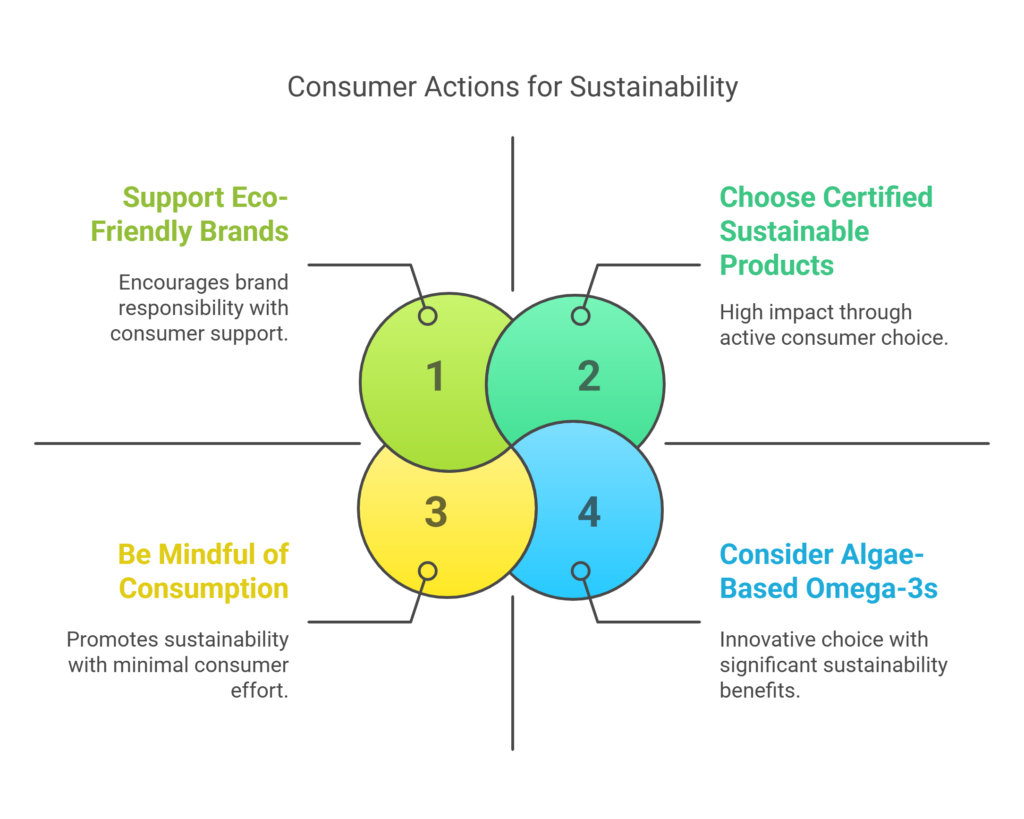
If you want to enjoy the benefits of krill oil while protecting the environment, here’s what you can do:
- Choose Certified Sustainable Products: Look for krill products bearing the Marine Stewardship Council (MSC) label, which ensures the krill was harvested responsibly.
- Support Eco-Friendly Brands: Opt for companies that invest in conservation and responsible fishing practices, demonstrating a commitment to environmental stewardship.
- Be Mindful of Consumption: Use krill-based products judiciously to prevent overconsumption, helping maintain ecological balance.
- Consider Algae-Based Omega-3s: If sustainability is your top priority, algae-derived omega-3 supplements offer a 100% eco-friendly alternative.
Are There Sustainable Krill Fisheries?
The good news is that many krill oil companies and regulatory bodies recognize these concerns and have implemented strict sustainability measures. Here’s how responsible krill harvesting is being managed:
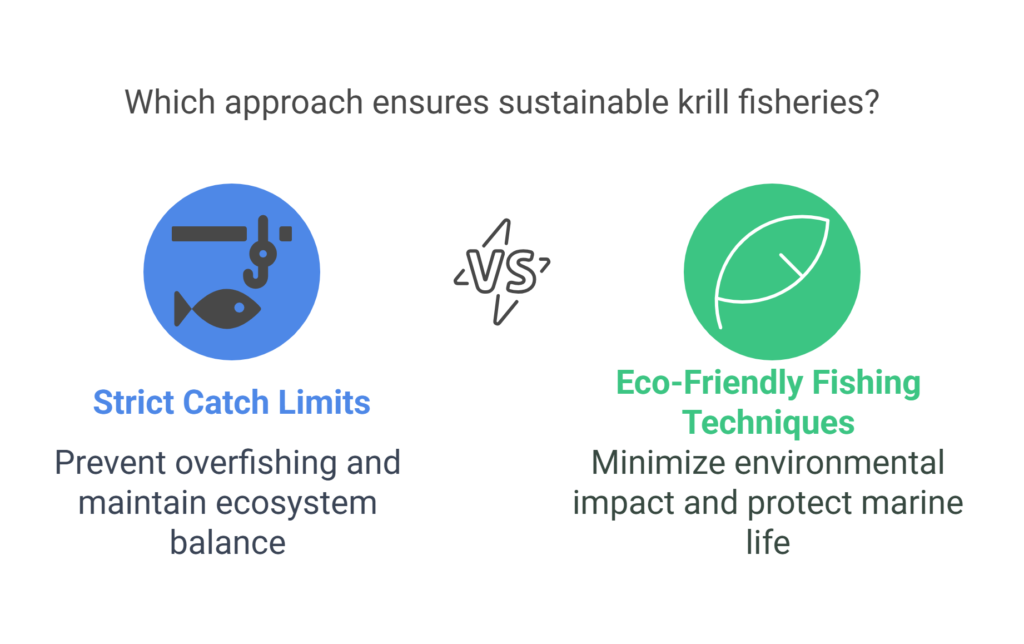
Strict Catch Limits
The Commission for the Conservation of Antarctic Marine Living Resources (CCAMLR) sets strict quotas for krill harvesting. Currently, only less than 1% of the total krill biomass is allowed to be fished annually far below what scientists consider a dangerous threshold.
Eco-Friendly Fishing Techniques
Some companies use advanced fishing methods that reduce environmental impact, such as:
- Continuous pumping systems, which minimize krill damage and reduce bycatch.
- Selective harvesting, which avoids capturing non-target species.
The Benefits of Krill Meat in Sustainability
Krill meat offers an eco-friendly alternative to krill oil, providing many of the same health benefits without the environmental concerns tied to oil extraction. Unlike krill oil, which requires a complex process to extract omega-3s, krill meat can be harvested more directly, reducing the need for extensive processing. This results in a lower environmental footprint.
- Minimal processing required: Krill meat is directly harvested and consumed without the extraction processes used in krill oil, leading to less waste and fewer harmful byproducts.
- Eco-friendly harvesting: Krill meat harvesting typically involves fewer chemicals and energy-consuming steps, making it a cleaner choice for sustainable sourcing.
- Preserving krill populations: Harvesting krill meat, in moderation, ensures krill populations can continue to thrive while still providing nutritional value to consumers.
Choosing krill meat as an alternative to krill oil allows consumers to support sustainable practices in the supplement and food industries, helping to preserve marine life and reduce the carbon footprint associated with krill-derived products.
Final Thoughts: Balancing Health and Conservation
As we continue to seek the health benefits of krill oil and krill meat, it’s essential to remember that these products are deeply intertwined with the health of our oceans. Krill are not just a key source of omega-3s; they also play a vital role in maintaining the balance of marine ecosystems. While the benefits of krill oil and meat are undeniable, ensuring their sustainability is equally important.
The responsibility lies with both consumers and industries. Consumers can make a big difference by choosing sustainably sourced products, whether it’s looking for MSC-certified krill oil or supporting brands committed to eco-friendly practices. On the other hand, industries must continue to adopt sustainable harvesting methods and invest in research to protect krill populations for future generations.
By making thoughtful, informed choices, we can enjoy the health benefits of krill oil and krill meat while preserving the oceans that provide them. The power to strike this balance is in our hands let’s use it wisely.

